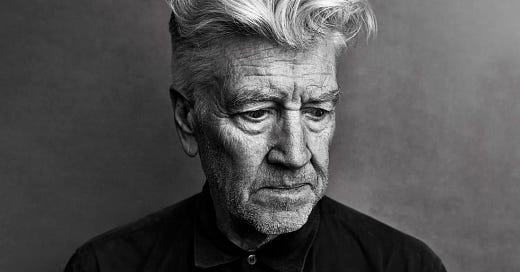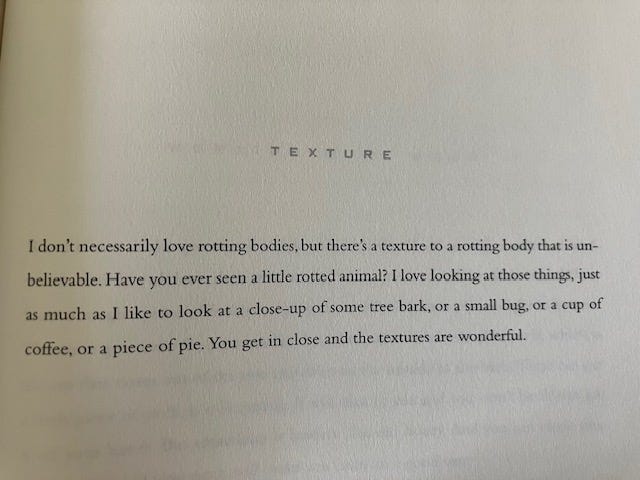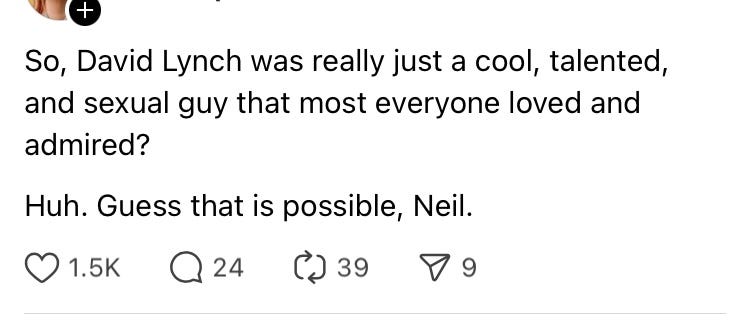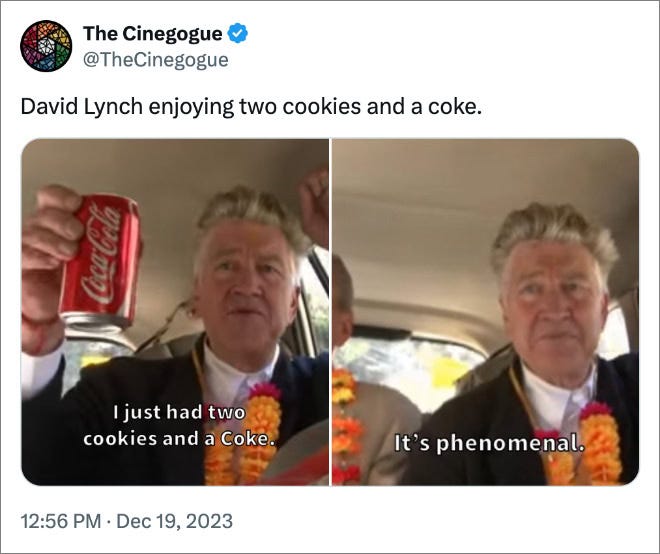I found out David Lynch died from Facebook. Facebook, of all places. At this stage in my life/our technological timeline, Facebook is primarily a platform I use to keep up with the various local groups I’m in—school updates, neighborhood drama that I will then read aloud to Hollis, etc. It isn’t a place I find out anything of value, certainly not the death of my favorite director. And yet that’s exactly what happened—I saw a statement from his family and froze in the kitchen, where I had paused before getting started on vacuuming. I opened up Variety. It was true. I stared into space for a little bit and then did my vacuuming with tears in my eyes.
Getting genuinely upset about the death of a person I did not know always feels a little bit performative to me, although I recently felt deeply sad about Liam Payne’s death. That was a different kind of sad, though, the kind of heartsickness that comes when you hear about someone too young being in a bad situation. David Lynch was in his late seventies and he was very sick, which we used as an anti-smoking PSA in our house. Still, his death was an absolute shock, and I guess that’s because he’d been a big part of my life for a very long time—as much as anyone can be when you’ve never met them.
My very first David Lynch memory is the cover of Twin Peaks: Fire Walk with Me. I’ve written before about a genre of films I call Blockbuster Movies, which are just…the movies I saw over and over on our frequent trips to Blockbuster. My dad loves renting a movie. He used Redbox long after most people had forgotten it. Anyway, I spent a lot of my childhood wandering up and down the aisles of Blockbuster and some titles were always there. Fire Walk with Me was one of them, and I couldn’t look away. Even without seeing the movie, somehow I knew that it was communicating exactly what the film was about. A beautiful girl. Danger. Soap opera and horror, all at once. Since Lynch’s death, people have been talking about Fire Walk with Me as if it’s a beloved classic, but are we engaging in a little bit of revisionist history? Because I remember that people hated this movie! I don’t know where I picked up on this—must’ve been all the magazines I read—but I definitely somehow knew that the film was booed at Cannes (although apparently that’s not true).
But I didn’t watch Fire Walk with Me as a child (thank God). My very first David Lynch film didn’t come until college. I had a film class where we were required to watch a certain number of films outside of class. Some guy let me borrow his DVD copy of Mulholland Drive, and you know what? I think this is actually an ideal way to watch your first Lynch—borrowing a DVD from a stranger in your film class. The main thing I remember about David Lynch at the time was that everyone thought he was inscrutably weird, like a puzzle you had to piece together (I guess that’s still the vibe today, but I think less so). Like, people could not get over how weird this guy was! He didn’t have chapters on his DVD menus and he didn’t want you to watch his films on a small screen. Animal Collective released an album backwards because they were inspired by a David Lynch movie. He was making people do things backwards. He could not be understood! Also everyone talked about that one jump scare. You know the one.
But I didn’t really get into David Lynch until post-college when I watched Twin Peaks. I was extremely unemployed (it was 2008), living at my parents’ house, and miserable. Escaping into the world of Twin Peaks was my lifeline. I loved its shifting tone, the way it veered into melodrama and then into comedy and then into horror. I loved the 50s/90s look of it, the weather, the trees, the music. Everyone looked hot but also like a cartoon character. No one ever understood Kyle MacLachlan’s appeal like David Lynch (half Cary Grant, half creep). It was all I had going for me for months. I got really into crocheting and made an orange/yellow/brown granny square blanket out of scratchy, cheap yarn while making my way through the series.
Eventually I got a job and moved out of my parents’ house, and by that point I’d become an official David Lynch fan. I watched his movies on my tiny TV with a combination DVD/VCR player that I won for having perfect attendance at a textbook packaging warehouse job the summer before (don’t be jealous). I rented the movies from Netflix, back when they still sent out DVDs, and walked my returns to the post office that was only one alley away from my apartment1. It was, again, the perfect way to watch David Lynch films, and I myself was in the perfect state: very lonely, pretty depressed. I didn’t watch all his films alone, though—I remember watching Lost Highway with Alex and having a really great time. I loved the scary Robert Blake scene, sure, but also Bill Pullman’s frenetic sax playing made us laugh.
I read books about and by him—Lynch on Lynch and Catching the Big Fish, which I absolutely love. A couple of years ago I downloaded the audiobook, read by him, and listened to it while walking around the neighborhood. It’s the best distillation you can get of his creative philosophy, which is overwhelmingly positive. It was really meaningful for me to hear someone talk about how creativity helps their life—so often you’ll see art framed as a torturous uphill battle, and that isn’t how David Lynch saw it at all. Also it’s full of pages like this.
He was a big part of my life even when I wasn’t watching his movies. I drank his coffee, back when I drank coffee.
I quoted him often, thought about him all the time. I get that it seems strange if you look at my work—I’m not sure you could find a straight line from his films to my rom-coms. I’ve never included a chopped off ear in a book, not even once. It reminds me of how when I was in high school Ryan Adams was always saying he wasn’t even influenced by country music, he was influenced by punk music, and then everyone was like, “well then why does your music sound like country and not punk?”2 That’s what I feel like talking about how much David Lynch means to me and how much he stays in my heart whenever I’m working. Maybe someday I will write something mysterious and dark! Don’t tempt me!
After his death, it was nice to read so many thoughtful interpretations of his work. His movies insist on thoughtfulness—okay, I guess that’s not true, you can just bail out and be like, “too weird for me!” if you don’t feel like following along. But in a world that often pushes us toward vapid consumerism, toward art and entertainment that only has one black-and-white interpretation, it felt good to see a lot of people engaging deeply with something that very explicitly does not have one meaning. When you watch his movies, you aren’t necessarily following a cohesive story because that’s not always what film does. A basic statement, but one that can feel downright revolutionary when you look at how many people talk about film.
“Okay, but why are you so down on the state of cinematic literacy?” you might be asking. It’s because I was on Threads! A terrible decision! I quit Threads after seeing opinions on David Lynch that made me want to pull my hair out of my head. This was the Thread that pushed me over the edge and made me delete my account.
I feel deeply uncomfortable any time we’re Mister Rogers-ing a cultural figure, holding them up to be this perfectly unproblematic person to use as an example. Because no one is actually like that. It’s like we need the artists we love to be virtuous so that we, too, can be virtuous, like a stain on them reflects on us. I saw someone respond that they were “worried” that something bad would come out about David Lynch…why? Not to be too callous, but it makes me wonder if these people know real people, like in real life. I call this Mister Rogersification, but I love Mister Rogers and he was also deeply weird. I think all the time about how he kept his weight at 143 because those were the number of letters in I Love You (also the title of a Katy Perry album, although presumably he wasn’t looking into the future and honestly we have no idea if Mister Rogers would love Katy Perry…we just don’t know). Should someone write a think piece about how that was an unhealthy fixation? I think a lot about how Jim Henson was amazing but probably not easy to be married to, if you read his biography. Should someone write a piece about how he was toxic? In case it isn’t clear, the answer is no. They were just people. They were allowed to be weird. I want to tell these people attaching their self-worth to David Lynch’s purity to not look into his voting record or think too much about how many times he was divorced.
There are plenty of things to criticize David Lynch about if you’re looking. Roger Ebert gave Blue Velvet one out of four stars and thought the film was misogynistic and unserious—he instead recommends Last Tango in Paris (a recommendation that didn’t exactly age well).
There is, indisputably, a ton of violence against women in Lynch’s films. There are beautiful women repeatedly put in horrific situations, being beaten or murdered or raped. It would be easy to write this off as a fetishization of violence, but it hasn’t ever read that way to me. It always felt more like an exploration of the darkness of men, a clear-eyed look at what men are actually capable of. Which is a much bleaker explanation, when you think about it.
His reliance on beautiful women reminds me of Hitchcock’s blondes—the difference being, of course, that Hitchcock blonde Tippi Hedren accused Hitchcock of controlling, abusing, and assaulting her3. The women who worked with David Lynch seemed to love working with him, and he was happy to work with them. Of course, we never really know what goes on behind the scenes, but I did find this little clip so sweet.
One week before David Lynch died, I showed my son his most family-friendly film, The Straight Story. Based on a true story and released by Disney, it’s about Alvin Straight (Richard Farnsworth), an elderly WWII vet who decides to drive his riding lawnmower hundreds of miles to visit his estranged brother (I will not tell you who plays the brother but it’s one of my faves). And that is literally it—it’s him riding that lawnmower, occasionally having engine problems, and meeting people along the way. Saying a film will “restore your faith in humanity” is so, so corny and I feel like that phrase is thrown around so much it’s become meaningless. But the movie is ultimately about the human desire for connection and it believes in an essential truth that I believe in, too, on my best days: that humans are good and that we ultimately want to help each other. That is a difficult belief to connect with right now if you’re even remotely paying attention to the news. The people we’re seeing in the headlines now have been completely corrupted by power and they don’t care about nature, art, helping anyone, or anything but money. If you spend too much time reading or thinking about these people, of course you’re going to have a bad view of humanity. But I don’t think most people are as morally bankrupt as, say, Elon Musk. Everyone who sees Alvin Straight helps him, and he helps them. They may not understand him, but they don’t turn him away. It’s a slow movie and a quiet one, but it’s one I felt so good about showing my kid because it shows a world you don’t have to be scared of. All Alvin wants is to see his brother again and make things right: “I want to make peace, I want to sit with him, look up at the stars... like we used to do, so long ago.” I want to cry just thinking about Richard Farnsworth delivering that line.
On a lighter note, I need you to know that I finally cured myself of my desire to spend over a thousand dollars on a transcendental meditation course. I did this by actually reading about what transcendental meditation was and the various scandals surrounding its founder4. I think the way David Lynch supported and used TM was admirable and I fully believe it can help people—I don’t think he was scamming anyone. I bet I would love it if I tried it, because I love regular meditation and believe its incredibly powerful. But regular meditation…is free.
In his family’s statement about his death, they said:
There’s a big hole in the world now that he’s no longer with us. But, as he would say, “Keep your eye on the donut and not on the hole.”
There are so many wonderful things that he said and did that will stick with me forever. You only need to read Catching the Big Fish to see how much he loved life and creating. I could share one million quotes from him about work and creativity (God knows I read and watched enough interviews with him in the weeks after his death), but I’ll end with this.
Eat something phenomenal and be amazed by the world today in his honor. I certainly will.
PS: We saw Father John Misty last night and he and David Lynch have so many similarities in my mind (too much to get into now, lol). Anyway, I loved this.
I lived on the second floor of a Victorian home that had been converted into apartments—the walls were so thin that I could hear the guy next door fart. The people around me were all a good thirty years older than me, and they were constantly getting into romantic entanglements. I recently came across a Facebook post I made from that time where I called it “the renovated Victorian house of discord.”
He was still at it as recently as 2014. This interview is a real trip.
I also did this by not really having an extra thousand dollars lying around, as I am only loosely employed at the moment.









I watched Twin Peaks religiously when it aired. I was in junior high and was obsessed. Because of this I watched Blue Velvet and was like, WHAT IS THIS. And because of my love of Twin Peaks, I saw Fire Walk With Me in my local art house theater on opening weekend. I was 16. I was NOT prepared. I thought it was going to give us an answer to what happened to Agent Cooper at the end of Twin Peaks season two but instead it was a PREQUEL????? I was PISSED. It was hard to be a David Lynch fan as someone who came to him from Twin Peaks because Twin Peaks aired on ABC. It was dark, but not AS DARK AS HIS FILMS COULD BE, because, you know, national broadcast television. But as I got older, I appreciated David more and more. I got used to his darkness and his weirdness and I never missed a film of his in the theater. I too was shocked and crushed at his passing. I will miss him forever. Thank you for sharing your thoughts on him.